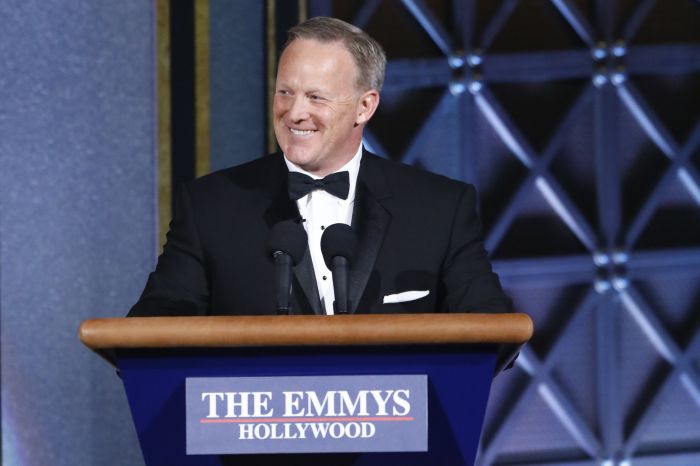About halfway through the Emmy telecast, the chairman of the Television Academy Hayma Washington, gave a speech about the diversity of Hollywood and the Emmys before playing a video celebrating POC, women and the LGBTQIA+ community in front of and behind the cameras. The video was, in essence, a celebration of the Emmys and a self-congratulatory pat on the back. Five minutes later, the entire audience rose to its feet to applaud Lena Waithe for becoming the first black woman to win an Emmy for writing. A few minutes after that, the Emmys’ “In Memoriam” segment featured a tribute to accused sexual assaulter Roger Ailes and ignored activist and comedian Dick Gregory.
The 69th Primetime Emmys was a white liberal pipe dream of how entertainment can be a form of resistance, but the show was mostly lip service and the safe type of faux-resistance that white privilege allows. Presented safely for the people least affected by white supremacy to begin with. The show started with the redemption of Sean Spicer, the former White House press secretary who spent months lying to the press and participating in misdirection that only furthered white supremacist rhetoric. Just five months ago, Spicer tried to erase the violence of the holocaust by saying Hitler didn’t use chemical weapons on his own people. But that didn’t matter anymore on Sunday night. Spicer, who also now has a job at Harvard, walked on stage to mock his own penchant for lying to the media to uproarious laughter and applause as Stephen Colbert, the beloved leader of the late-night anti-Trump talk show circuit fed him jokes. The forgiveness of Spicer is coated in white power. Imagine Maxine Waters taking the stage at the Country Music Awards and getting laughs. Or being showered with hugs and kisses on the cheek at the after-party.
Much of the first hour of the Emmys was spent parading SNL as the example of how political comedy is done right. The show took home an award for Outstanding Variety Sketch while Alec Baldwin’s portrayal of Donald Trump earned him Outstanding Supporting Actor in a Comedy Series and Kate McKinnon took home Outstanding Supporting Actress in a Comedy Series. SNL, of course, has been deified as the blueprint for anti-Trump political commentary despite the fact the show played a pivotal role in normalizing candidate Trump by letting him host after he’d called Mexicans drug dealers and rapists. SNL has exonerated itself from its role in positioning Trump as a harmless candidate without really having to atone for its sins. The show never addressed its role in mainstream acceptance of Trump and just carried on as if it were flawless resistance comedy.
But SNL, like the Emmys that spent so much time celebrating it, never took its audience to task. SNL was solely concerned with making White America laugh without having to confront its role in getting Donald Trump elected. SNL’s sole function became making White Americans feel better about the election without ever asking how Trump was elected. It created a safe comedy space that never pushed the envelope to ask America the questions that needed to be asked. And the Emmys didn’t hesitate to award the show for executing that function.
In the meantime, The Emmys would forget to honor Dick Gregory, who was an actual voice of resistance, who put his life on the line countless times to fight racism and government-sanctioned anti-blackness. Gregory was the type of resistance entertainment a show like SNL never bothered to be and might never be able to accomplish even if it tried. Dick Gregory was never safe.
The Emmys did give people of color proud moments to feel attached to. We did get Donald Glover being the first African-American to win Best Director in a Comedy and the first African-American to win Best Actor In A Comedy since 1985. As mentioned, Lena Waithe became the first black woman to win an Emmy for writing. Riz Ahmed was the first South Asian to win an Emmy in acting and it was genuinely emotional to see Sterling K. Brown’s impassioned acceptance speech for Best Actor in a Drama. The Emmys, of course, rejoiced in these awards as a sign of progress, but again didn’t ask the tough questions. The fact that it’s been 32 years since a black person won best actor in a comedy – encompassing the years in which Bill Cosby starred in The Cosby Show and Will Smith starred in The Fresh Prince Of Bel-Air – is nothing short of a travesty. And any time a non-white male does something for the first time in 2017 and beyond, it should require the gatekeepers of that accomplishment to wonder why it took so long. The Emmys was happy to rejoice in these multicultural victories, as was I, but the Emmys didn’t want to ask why it took so long. What is the apparatus in place that kept people of color away from these awards for all of these years and have they really changed?
No, instead the Emmys did the most typically American thing imaginable: ignored the past and the reasons we are where we are and celebrated itself for any modicum of progress awarded people of color. To them, Spicer’s lies and hate-peddling didn’t matter. Dick Gregory’s sacrifices didn’t matter. SNL’s Trump support didn’t matter. And years of neglecting brilliant people of color didn’t matter. All that mattered was allowing white people – who don’t experience the effects of oppression in any tangible way like people of color do – to absolve themselves of their roles in perpetuating white power. And in the end, for too many white liberals, that’s all that matters.









Comments
Bossip Comment Policy
Please read our Comment Policy before commenting.